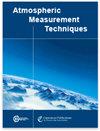利用应用于空气质量传感器网络的浓度相似性指数对 PM2.5 进行空间分析
IF 3.3
3区 地球科学
Q2 METEOROLOGY & ATMOSPHERIC SCIENCES
引用次数: 0
摘要
摘要空气质量传感器(AQS)网络可用于绘制城市环境中 PM2.5(直径为 2.5 µm 或更小的颗粒)的分布图,但目前对观测到的空间和时间变化的定量评估还不完善。本研究引入了一个新指标--浓度相似性指数(CSI)--以方便对空气质量传感器网络中每个传感器测量到的 PM2.5 浓度-时间曲线进行定量和时间平均比较。CSI 功能是在一个数据集上开发的,该数据集具有最小的无法解释的变化和稳健的测试,CSI 功能用于对监测网络覆盖区域内的空气质量变化进行无偏公平的描述。测量数据用于推导网络中每对传感器组合的 CSI 值,从而获得 PM2.5 空间变化的宝贵信息。这种新方法分别应用于爱尔兰邓加文和科克市的两个空气质量监测网络。Dungarvan 的 CSI 平均值较低(x‾CSI, Dungarvan=0.61,x‾CSI, Cork=0.71),表明网络中不同地点之间的总体相似性较低。在这两个网络中,每个传感器的平均昼夜图都显示出由于居民固体燃料燃烧排放造成的傍晚 PM2.5 浓度峰值;但是,该峰值的大小存在很大差异。应用于 CSI 矩阵的聚类技术在每个网络中识别出两种不同的位置类型:位于中心或居民区的位置受到固体燃料燃烧的污染较多,而位于城市边缘的位置空气较清新。这两种地点类型的 PM2.5 平均值在 Dungarvan 相差 6 微克/立方米,在科克相差 2 微克/立方米。此外,对冬季和夏季月份(1 月和 5 月)的研究表明,在居民固体燃料燃烧增加的时期,PM2.5 水平较高,是造成两个网络中不同地点之间差异较大(相似性指数较低)的主要原因,季节性 CSI 平均值的差异超过了 0.25,季节性 PM2.5 平均值的差异超过了 7 µg m-3。这些发现强调了将冬季可吸入颗粒物数据纳入分析的重要性,因为在固体燃料燃烧活动高峰期,不同地点之间的差异会加大。此外,CSI 方法还有助于评估在空气质量监管监测点测量到的 PM2.5 在人口暴露方面的代表性,这表明在相似性和空间代表性评估方面,地点类型比物理距离更重要。以这种方式应用 CSI 可以优化监测基础设施的布置。结果表明,Dungarvan的PM2.5人口暴露在当前监管监测点的代表性一般(x‾CSI=0.63),而科克的监管监测点很好地代表了全市的PM2.5水平(x‾CSI=0.76)。本文章由计算机程序翻译,如有差异,请以英文原文为准。
Spatial analysis of PM2.5 using a concentration similarity index applied to air quality sensor networks
Abstract. Air quality sensor (AQS) networks are useful for mapping PM2.5 (particles with a diameter of 2.5 µm or smaller) in urban environments, but quantitative assessment of the observed spatial and temporal variation is currently underdeveloped. This study introduces a new metric – the concentration similarity index (CSI) – to facilitate a quantitative and time-averaged comparison of the concentration–time profiles of PM2.5 measured by each sensor within an air quality sensor network. Following development on a dataset with minimal unexplained variation and robust tests, the CSI function is used to represent an unbiased and fair depiction of the air quality variation within an area covered by a monitoring network. The measurement data is used to derive a CSI value for every combination of sensor pairs in the network, yielding valuable information on spatial variation in PM2.5. This new method is applied to two separate AQS networks, in Dungarvan and in the city of Cork, Ireland. In Dungarvan there was a lower mean CSI value (x‾CSI, Dungarvan=0.61, x‾CSI, Cork=0.71), indicating lower overall similarity between locations in the network. In both networks, the average diurnal plots for each sensor exhibit an evening peak in PM2.5 concentration due to emissions from residential solid-fuel burning; however, there is considerable variation in the size of this peak. Clustering techniques applied to the CSI matrices identify two different location types in each network; locations in central or residential areas that experience more pollution from solid-fuel burning and locations on the edge of the urban areas that experience cleaner air. The difference in mean PM2.5 between these two location types was 6 µg m−3 in Dungarvan and 2 µg m−3 in Cork. Furthermore, the examination of winter and summer months (January and May) indicates that higher PM2.5 levels during periods of increased residential solid-fuel burning act as a major driver for greater differences (lower similarity indices) between locations in both networks, with differences in mean seasonal CSI values exceeding 0.25 and differences in mean seasonal PM2.5 exceeding 7 µg m−3. These findings underscore the importance of including wintertime PM data in analyses, as the differences between locations is enhanced during periods when solid-fuel burning activities are at a peak. Additionally, the CSI method facilitates the assessment of the representativeness of the PM2.5 measured at regulatory air quality monitoring locations with respect to population exposure, showing here that location type is more important than physical proximity in terms of similarity and spatial representativeness assessments. Applying the CSI in this manner can allow for the placement of monitoring infrastructure to be optimised. The results indicate that the population exposure to PM2.5 in Dungarvan is moderately represented (x‾CSI=0.63) by the current regulatory monitoring location, and the regulatory monitoring location assessed in Cork represented the city-wide PM2.5 levels well (x‾CSI=0.76).
求助全文
通过发布文献求助,成功后即可免费获取论文全文。
去求助
来源期刊

Atmospheric Measurement Techniques
METEOROLOGY & ATMOSPHERIC SCIENCES-
CiteScore
7.10
自引率
18.40%
发文量
331
审稿时长
3 months
期刊介绍:
Atmospheric Measurement Techniques (AMT) is an international scientific journal dedicated to the publication and discussion of advances in remote sensing, in-situ and laboratory measurement techniques for the constituents and properties of the Earth’s atmosphere.
The main subject areas comprise the development, intercomparison and validation of measurement instruments and techniques of data processing and information retrieval for gases, aerosols, and clouds. The manuscript types considered for peer-reviewed publication are research articles, review articles, and commentaries.
 求助内容:
求助内容: 应助结果提醒方式:
应助结果提醒方式:


